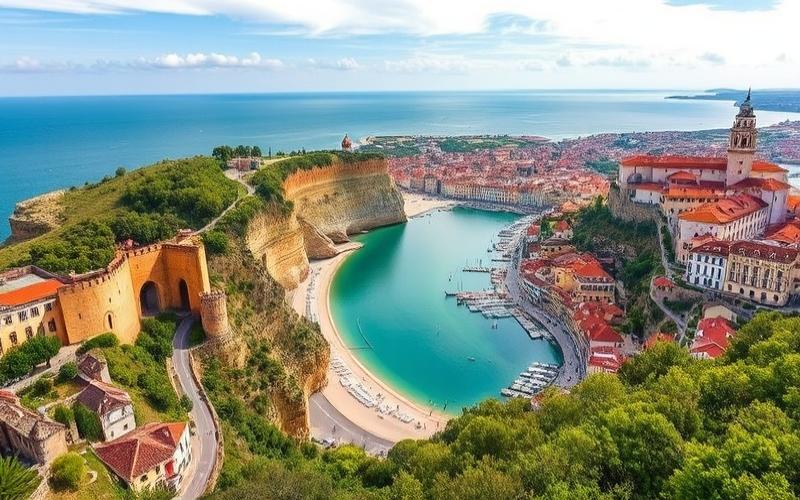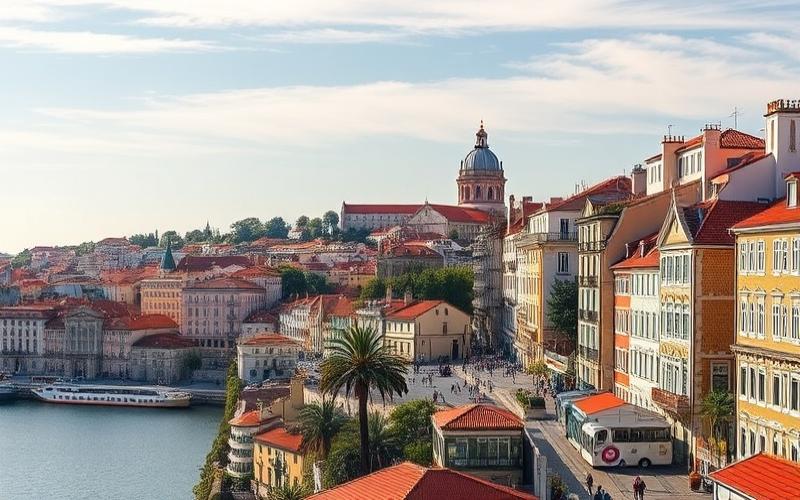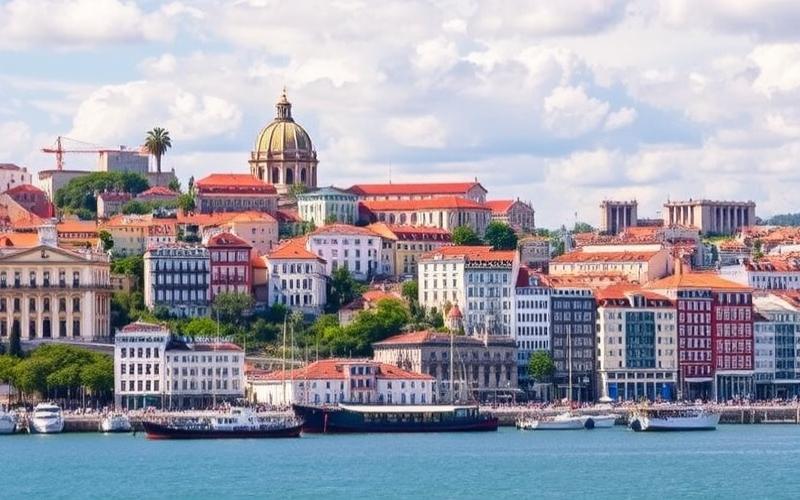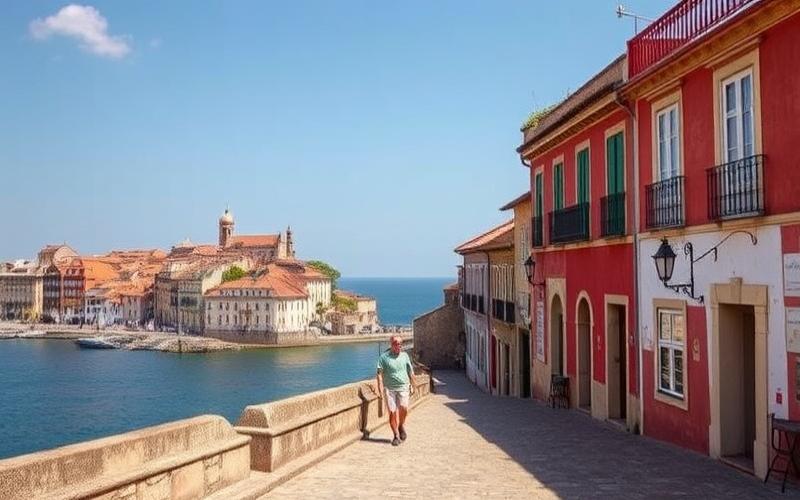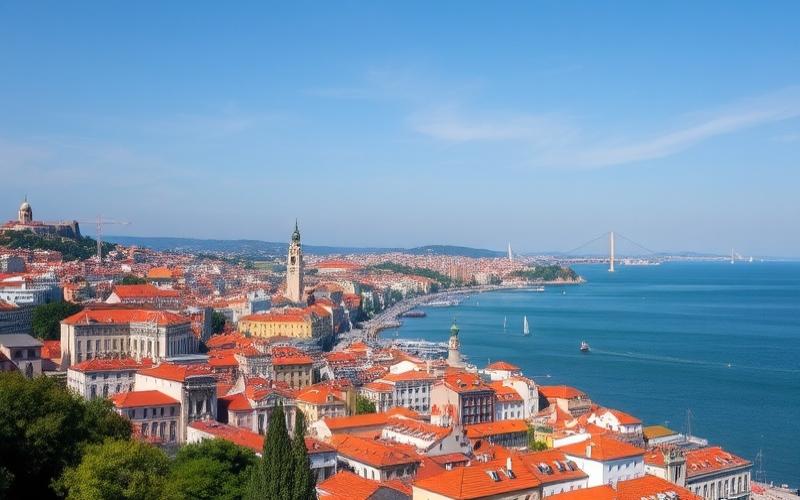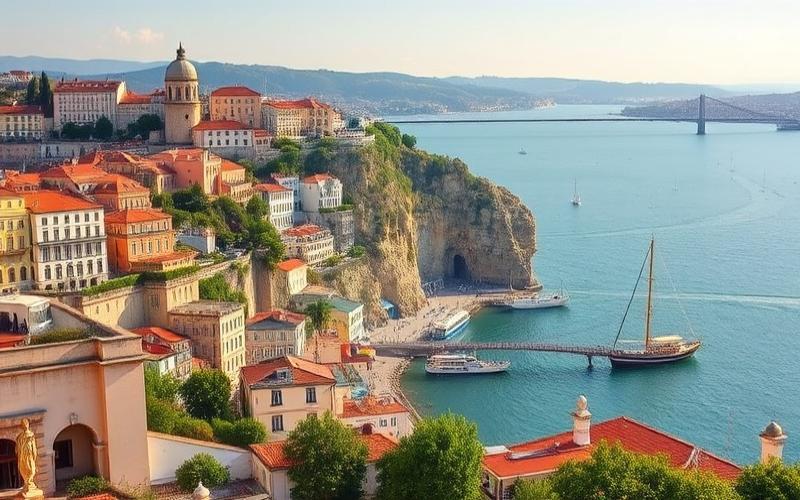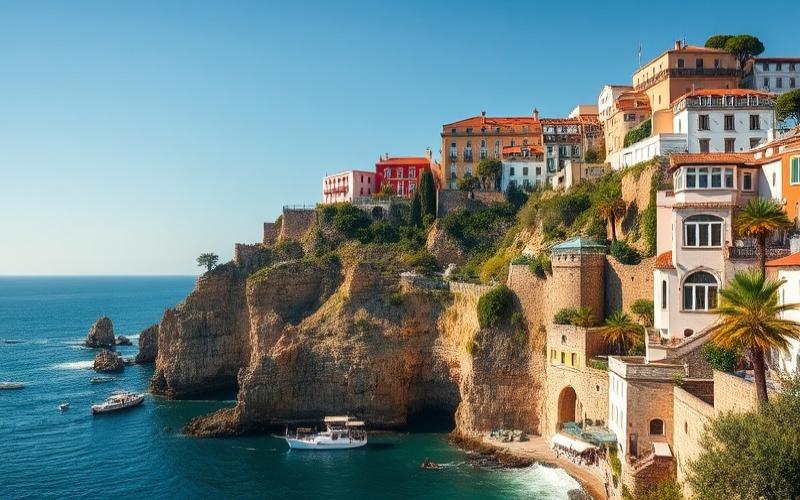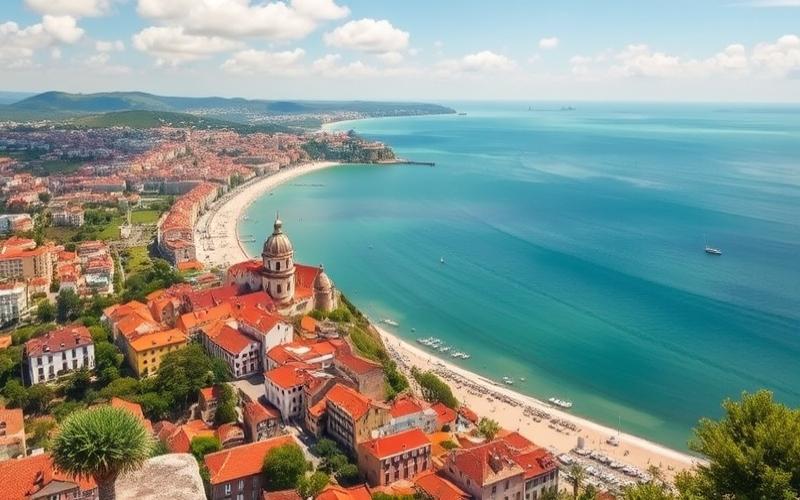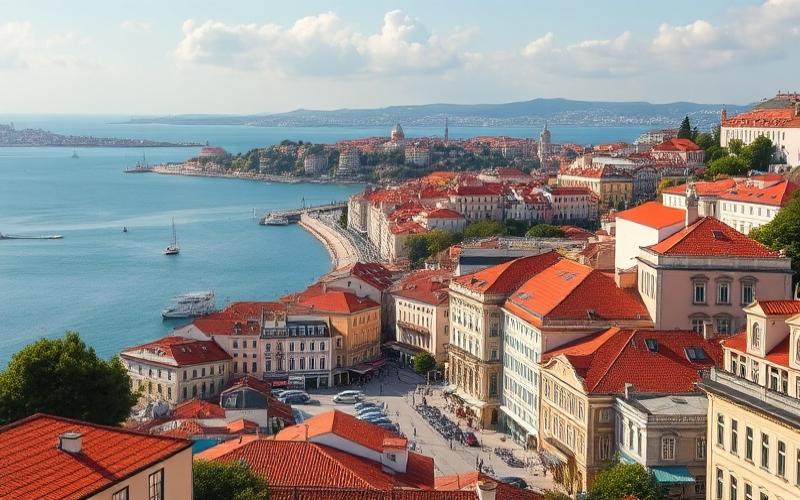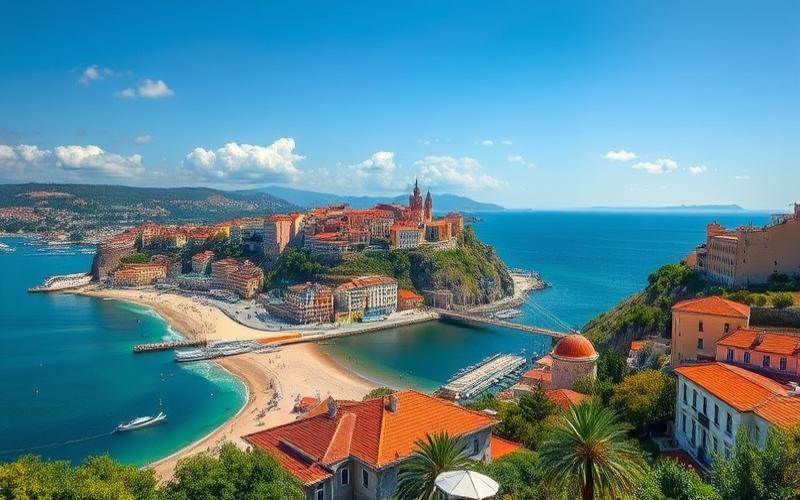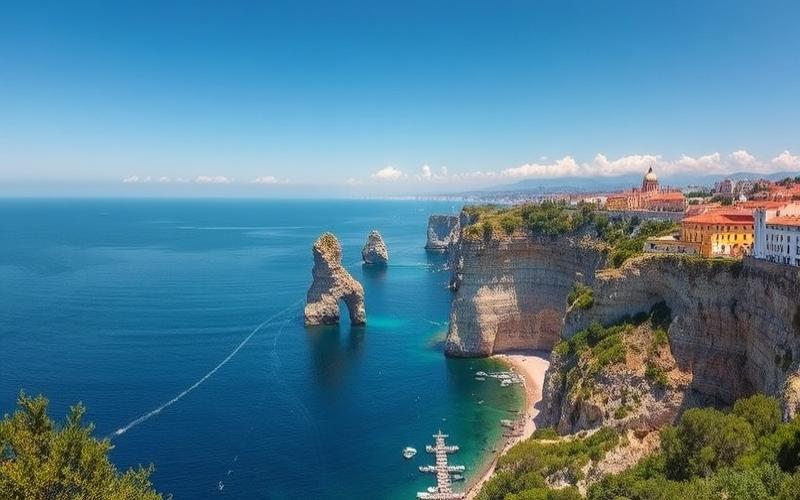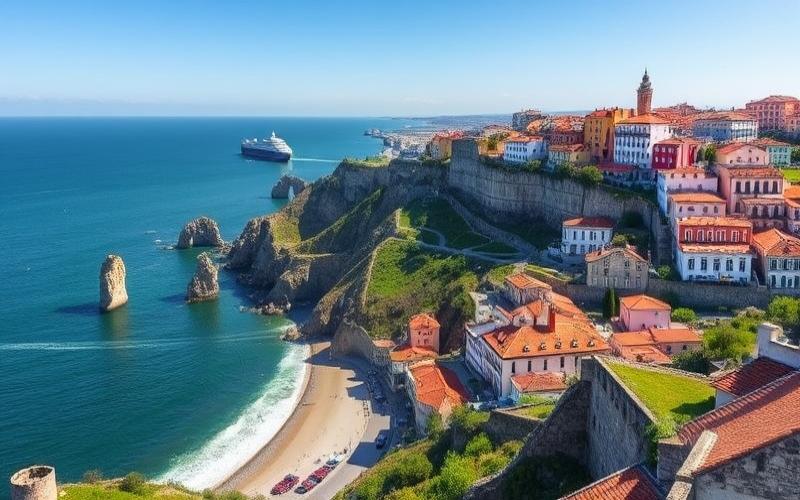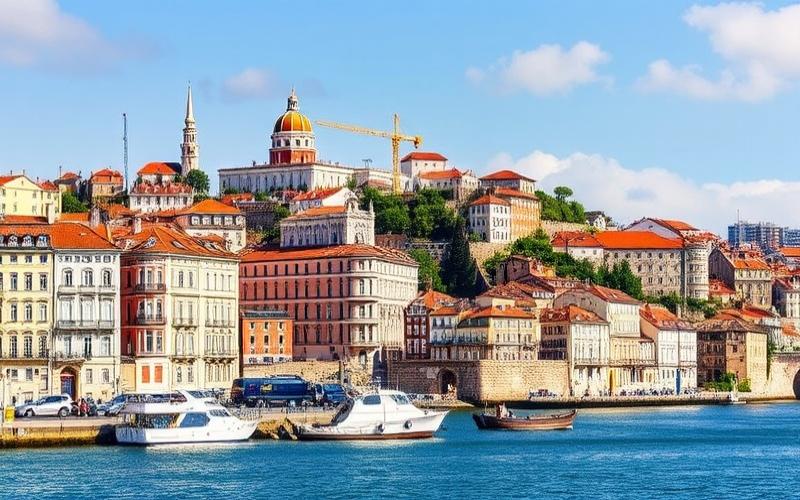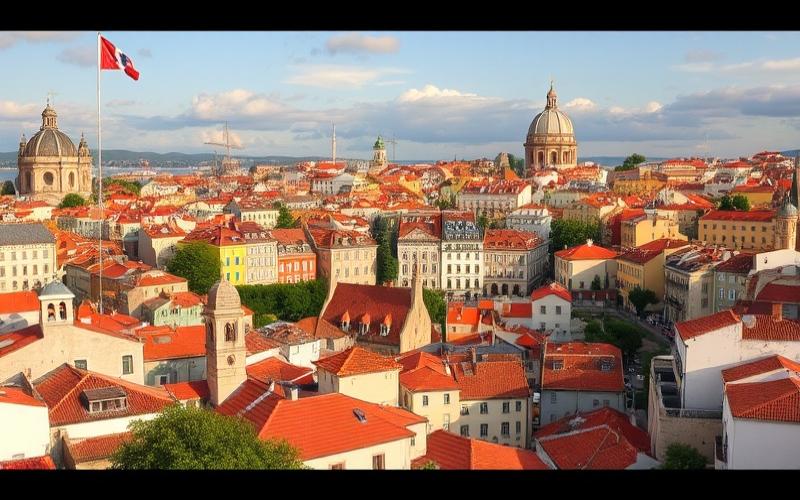
 Published on and written by Cyril Jarnias
Published on and written by Cyril Jarnias
Portugal, a country with rich and diverse culinary traditions, offers expatriates a unique gastronomic adventure. Between marine flavors, succulent meats, and sweet treats, Portuguese cuisine is a true sensory journey that reflects the history and culture of this fascinating country. This guide will take you to discover Lusitanian culinary treasures, from colorful markets to starred restaurants, including typical small bistros. Get ready for a total immersion in the Portuguese art of living!
The Pillars of Portuguese Gastronomy
Portuguese cuisine relies on simple but quality ingredients, skillfully transformed into tasty and comforting dishes. Olive oil, aromatic herbs, seafood, and bacalhau (dried codfish) are omnipresent in traditional recipes.
Codfish, a true national emblem, comes in hundreds of recipes. “Bacalhau à brás,” a mix of shredded cod, scrambled eggs, and fried potatoes, is a must-try. Meat lovers will enjoy “cozido à portuguesa,” a hearty stew combining various meats and vegetables.
Mediterranean influences are found in the generous use of olive oil and fresh herbs like parsley, cilantro, or bay leaf. Portuguese cuisine also highlights vegetables, with dishes like “migas” (fried bread with vegetables) or “caldo verde” soup.
Desserts hold a special place in Lusitanian gastronomy. “Pastéis de nata,” small custard tarts in crispy puff pastry, have become a national symbol. Each region has its sweet specialties, often inherited from convent traditions.
Good to know:
Portuguese cuisine is generous and friendly. Meals are often an opportunity to share a moment with family or friends, around hearty dishes served at the table.
Discovering Traditional Markets
To immerse yourself in Portuguese culinary culture, nothing beats a visit to local markets. These lively places are the beating heart of gastronomy, where producers and artisans offer fresh, seasonal products.
In Lisbon, the Mercado da Ribeira is a must-see. This historic market now houses a modern food court where you can taste creations from renowned chefs. For a more authentic atmosphere, head to the Mercado de Campo de Ourique, less touristy but just as charming.
In Porto, the Mercado do Bolhão is an institution. Recently renovated, this 19th-century covered market offers a complete overview of regional products: cheeses, cured meats, fruits and vegetables, fish, and seafood.
In the Algarve, don’t miss the Olhão market, famous for its stalls of freshly caught fish. It’s the ideal place to discover the diversity of Portuguese seafood.
During your visits, don’t hesitate to chat with the vendors. They will be delighted to share their knowledge about local products and can give you preparation tips.
Good to know:
Markets are usually open early in the morning. To enjoy the best products and an authentic atmosphere, plan to go at opening time.
Iconic Restaurants Not to Miss
Portugal has been experiencing a true gastronomic revival in recent years. Many talented chefs are creatively revisiting the national culinary heritage while remaining faithful to authentic flavors.
In Lisbon, the restaurant Belcanto by chef José Avillez, with two Michelin stars, offers exceptional contemporary Portuguese cuisine. For a more traditional experience, O Faia in the Bairro Alto district offers family-style cuisine in a typical setting, accompanied by fado in the evening.
In Porto, DOP by chef Rui Paula revisits Portuguese classics with finesse. To taste the local specialty, “tripas à moda do Porto,” head to Abadia do Porto, an institution since 1939.
In the Algarve, the restaurant Ocean at the Vila Vita Parc hotel, with two Michelin stars, elevates seafood. For a more relaxed atmosphere, A Ria in Olhão offers ultra-fresh seafood in a picturesque waterfront setting.
Don’t forget to explore small neighborhood restaurants, often called “tascas.” These family-run establishments offer simple but tasty cuisine at affordable prices. This is where you’ll taste the true soul of Portuguese gastronomy.
Good to know:
Reservations are highly recommended in fine dining restaurants, especially during high season. For more modest establishments, it’s often possible to get a table without a reservation, but be prepared to wait a bit during peak hours.
Contemporary Culinary Trends
While remaining rooted in its traditions, the Portuguese gastronomic scene is opening up to new influences and trends. The new generation of chefs doesn’t hesitate to shake up the codes while respecting the local terroir.
Fusion cuisine is gaining ground, blending Portuguese flavors with international influences. The restaurant Arkhe in Lisbon, recently starred, offers creative vegetarian cuisine that challenges preconceptions about Lusitanian gastronomy.
The locavore movement is growing, with more and more restaurants highlighting local and seasonal products. Feitoria in Lisbon, a Michelin-starred restaurant, is an excellent example of this philosophy, offering refined cuisine based on ingredients sourced from small producers.
Portuguese street food is also reinventing itself. Food trucks and gourmet markets offer revisited versions of classics like “prego” (steak sandwich) or “bifana” (pork sandwich). The Time Out Market in Lisbon is an excellent place to discover these new trends.
Finally, wine tourism is experiencing significant growth. Many wine estates are opening their doors to visitors, offering tastings and gastronomic experiences around local wines. The Douro region, birthplace of port, is particularly suitable for this type of activity.
Good to know:
Don’t hesitate to go off the beaten path to discover these new trends. Gentrifying neighborhoods like Marvila in Lisbon or Bonfim in Porto are often at the forefront of these culinary innovations.
Table Etiquette: Codes to Know
Understanding Portuguese table etiquette will help you integrate more easily and avoid faux pas during social meals.
In a family context, the atmosphere is generally relaxed. Meals are moments of sharing and conviviality. It’s common to serve yourself directly from the dishes placed in the center of the table. Don’t hesitate to compliment the cooking; it’s always appreciated.
In a professional setting, the tone is more formal. Wait for your host to indicate your seat and for all guests to be served before starting to eat. Professional discussions usually only begin after the main course.
In formal restaurants, the codes are similar to those in other European countries. Use utensils from the outside in. Bread is often served without butter and is eaten by hand.
- It’s polite to wait until all glasses are filled before making a toast.
- Avoid asking for salt and pepper before tasting the dish, as it could be perceived as a lack of trust in the chef.
- It’s common to leave a tip of 5 to 10% in restaurants, unless service is already included.
Good to know:
Portuguese people tend to eat late, especially in the evening. Dinner rarely starts before 8 PM and can extend late into the night, especially on weekends.
Finding International Ingredients
Although Portuguese cuisine is delicious, it’s natural for an expatriate to sometimes want to cook dishes from their home country. Fortunately, it’s increasingly easy to find international ingredients in Portugal.
In large cities like Lisbon and Porto, several specialized supermarkets offer a wide range of international products. El Corte Inglés in Lisbon has a section dedicated to products from around the world. In Porto, Mercado do Bom Sucesso offers an interesting selection of international fine foods.
Asian grocery stores are increasingly numerous and well-stocked. They are particularly useful for finding ingredients used in Chinese, Japanese, or Thai cuisines.
For organic and vegetarian/vegan products, chains like Celeiro or Miosótis offer a wide choice of plant-based alternatives and superfoods.
Don’t forget producer markets, which often host stalls specializing in foreign products. The Cascais market, for example, has several stalls offering British and German specialties.
Finally, many online shopping sites now deliver to Portugal. It’s a convenient option for finding rarer or more specific products from your home country.
Good to know:
If you can’t find a specific ingredient, don’t hesitate to ask local merchants for advice. They can often suggest a Portuguese equivalent or tell you where to find the product you’re looking for.
Conclusion: Savor the Portuguese Culinary Adventure
Expatriating to Portugal means treating yourself to a true gastronomic adventure. Portuguese cuisine, rich in traditions and open to world influences, will delight the most demanding palates. From colorful markets to starred tables, including small neighborhood tascas, every meal is an opportunity to discover a new facet of Lusitanian culture.
Don’t hesitate to step out of your culinary comfort zone. Taste local specialties, exchange with producers and chefs, and let yourself be surprised by the creativity of the new Portuguese gastronomic scene. You’ll discover that cuisine is much more than a mere necessity in Portugal: it’s an art of living, a moment of sharing and conviviality.
Whether you’re a seasoned gourmet or simply curious about new flavors, Portugal holds countless culinary discoveries for you. So, to the table and bon appétit… or as they say here, “bom apetite”!
Good to know:
The best way to discover Portuguese gastronomy is to keep an open mind and taste everything. Don’t hesitate to ask locals for recommendations; they’ll be delighted to share their favorite spots and dishes.
Disclaimer: The information provided on this website is for informational purposes only and does not constitute financial, legal, or professional advice. We encourage you to consult qualified experts before making any investment, real estate, or expatriation decisions. Although we strive to maintain up-to-date and accurate information, we do not guarantee the completeness, accuracy, or timeliness of the proposed content. As investment and expatriation involve risks, we disclaim any liability for potential losses or damages arising from the use of this site. Your use of this site confirms your acceptance of these terms and your understanding of the associated risks.



